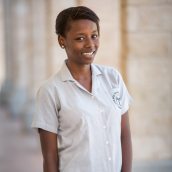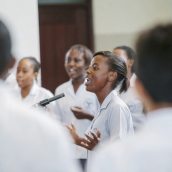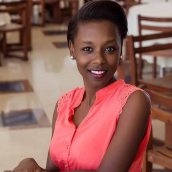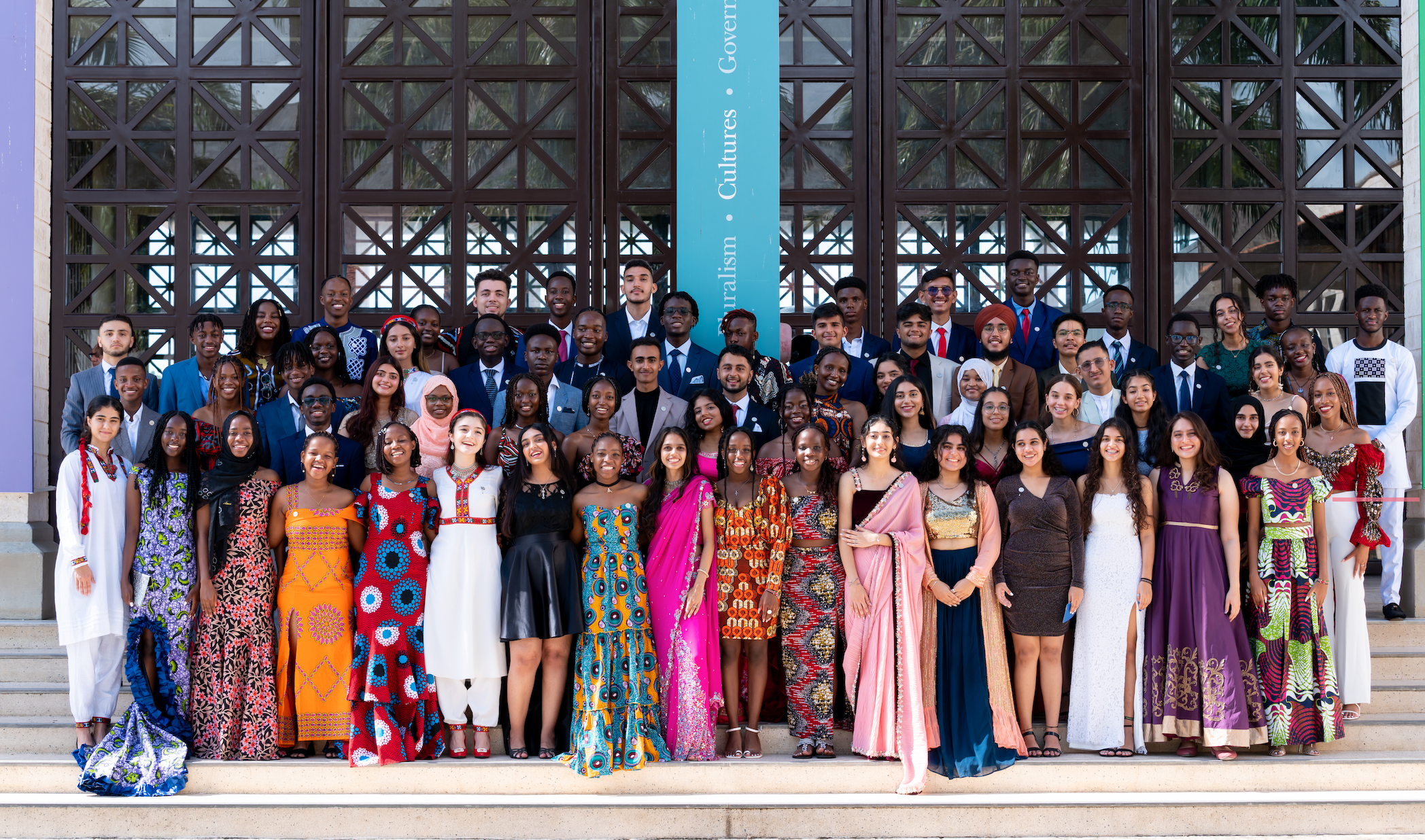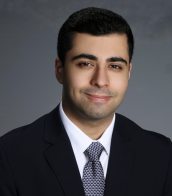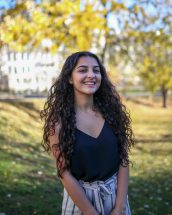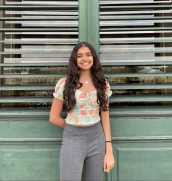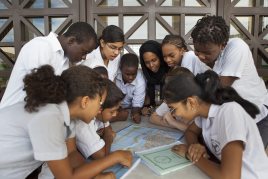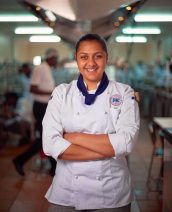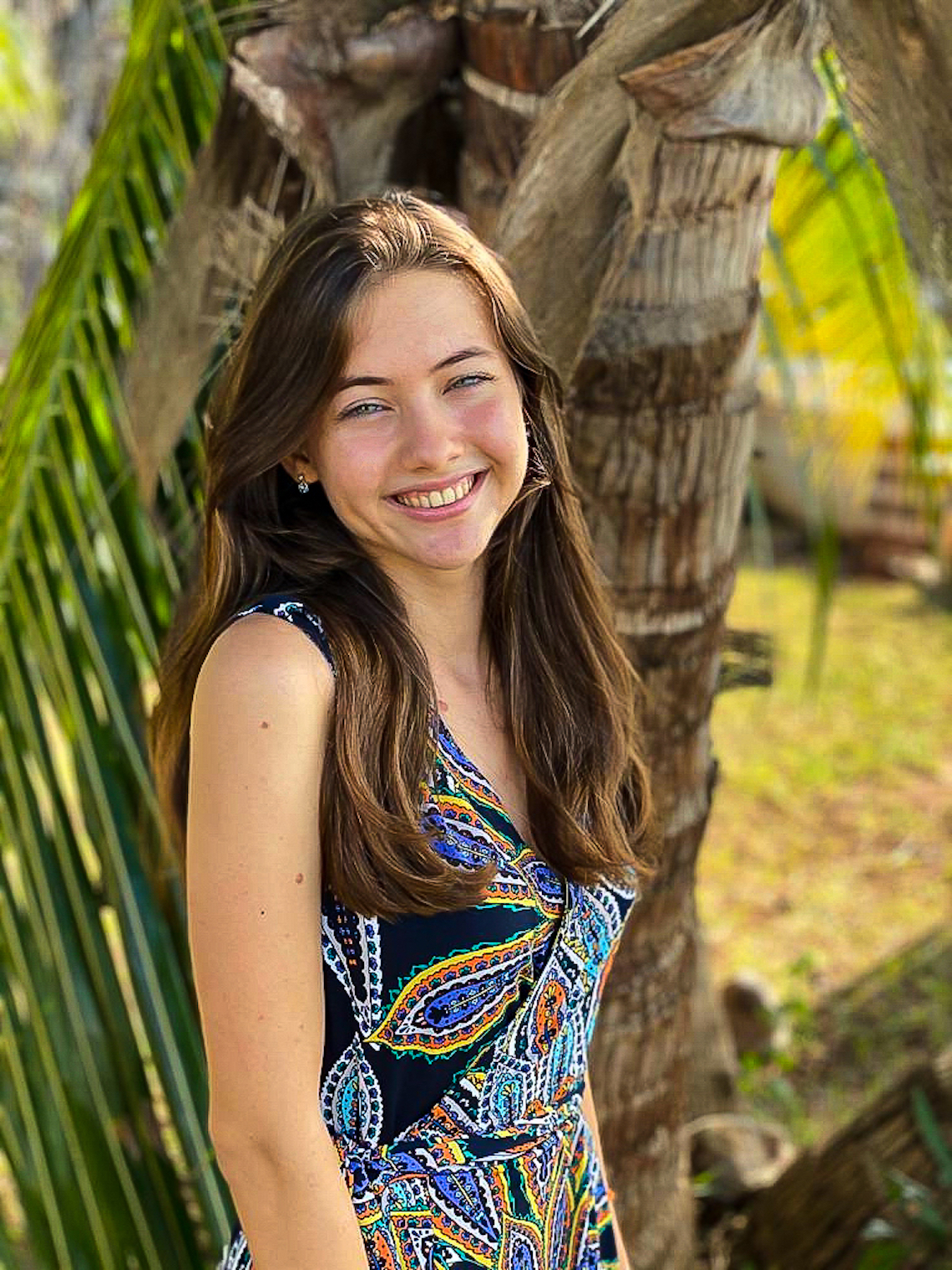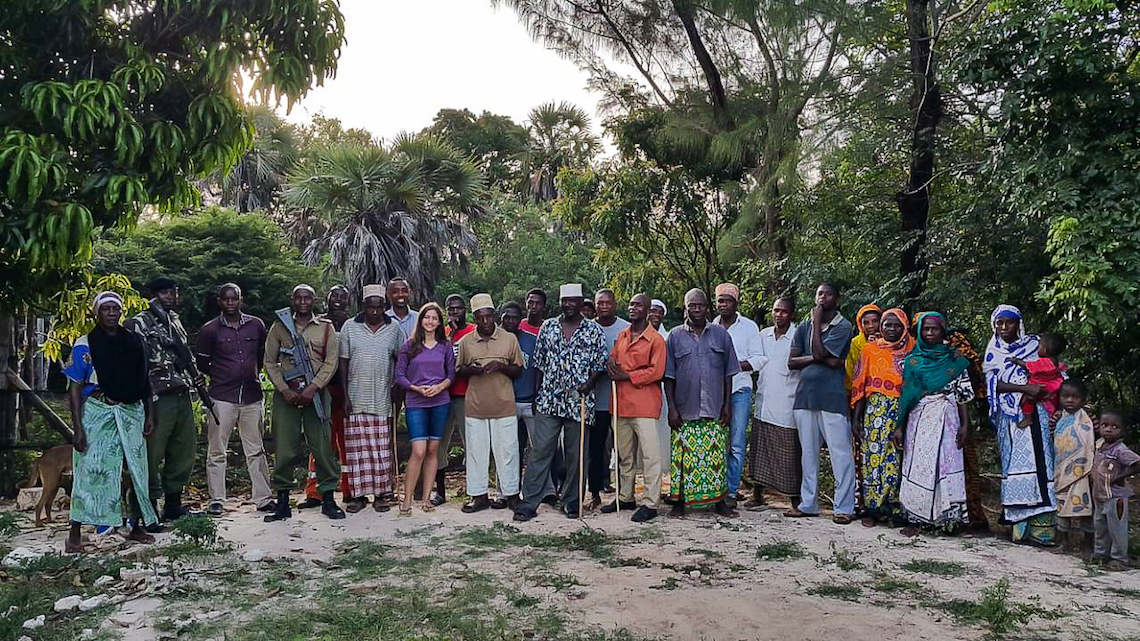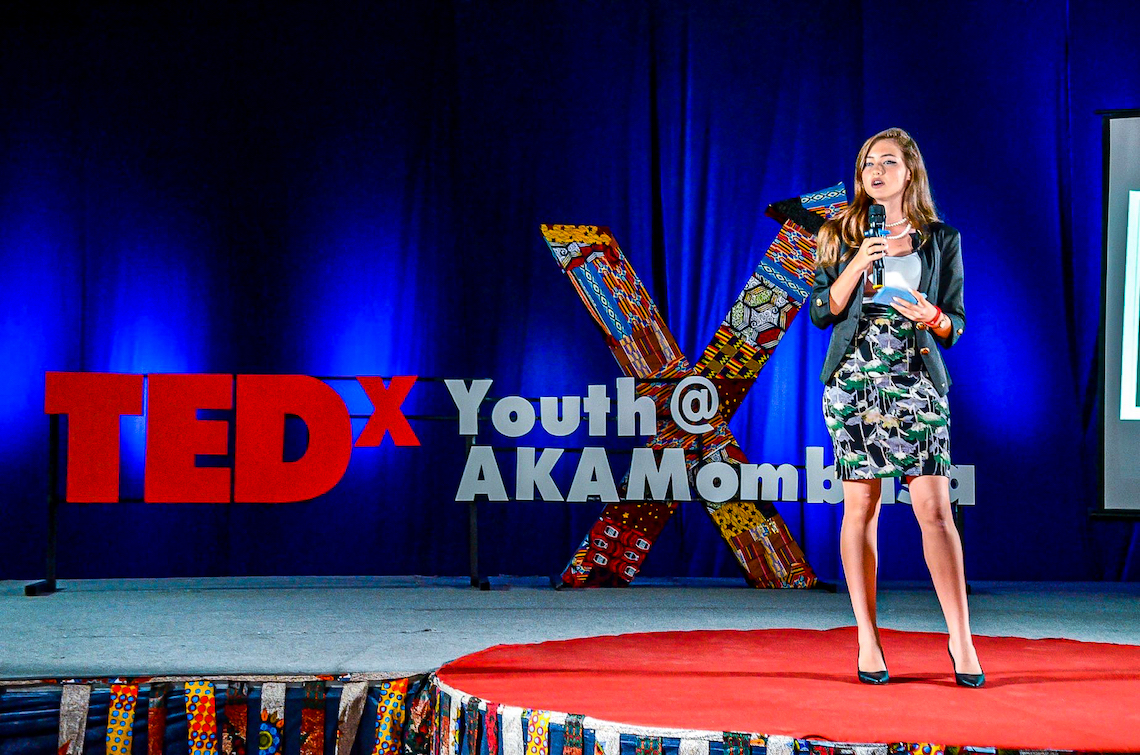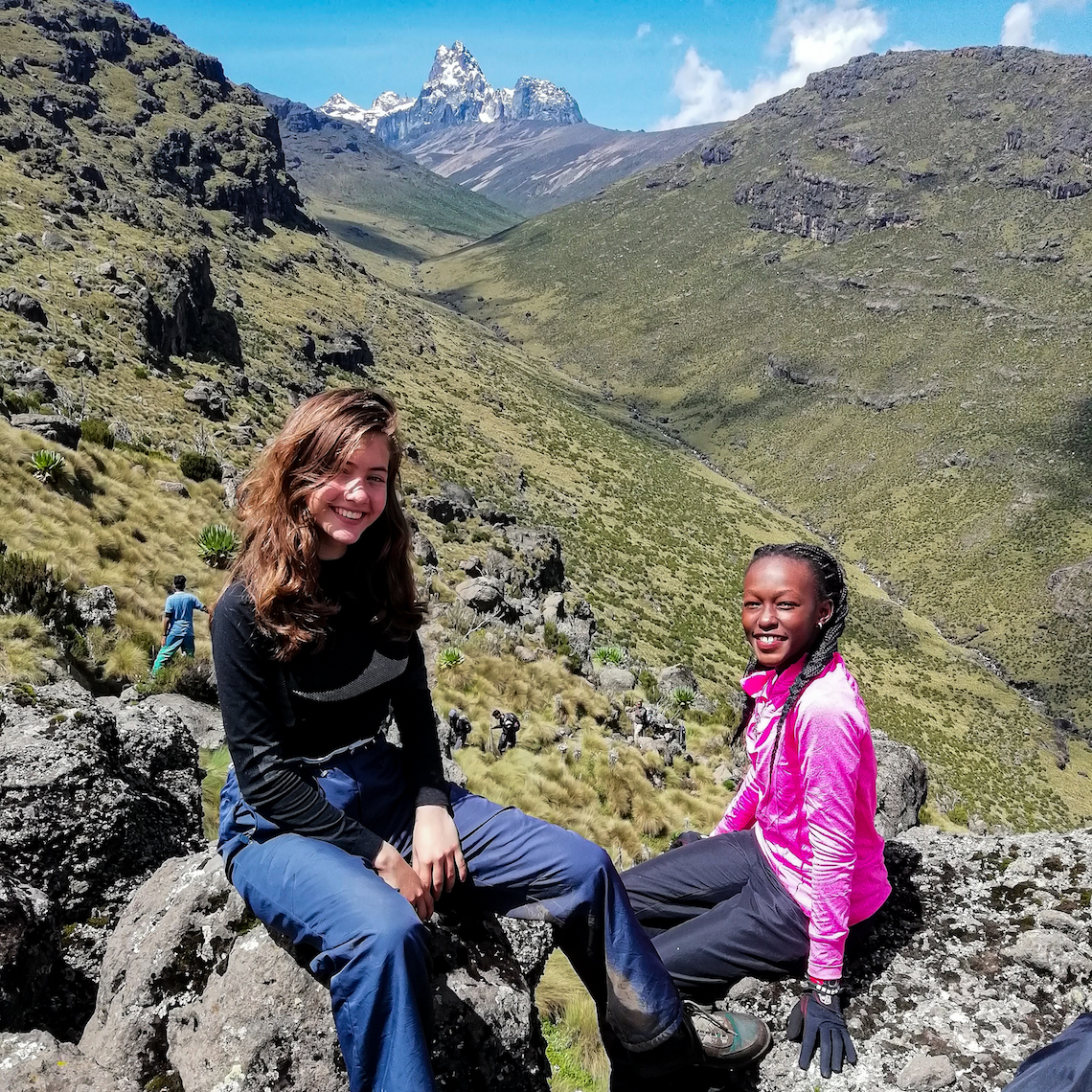At the Aga Khan Academy Mombasa, Ham Serunjogi – CEO and co-founder of African fintech giant Chipper Cash – realised the importance of staying connected to something larger than himself. The Forbes 30 Under 30 honouree is now serving as an advisor to the US President on African diaspora engagement.
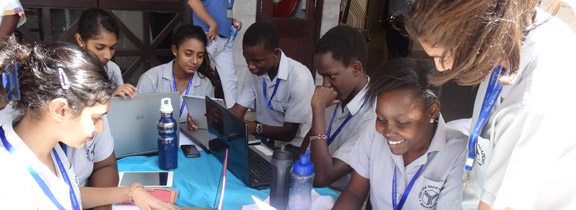
The AKA Learner Profile
The Aga Khan Academies (AKA) have developed a curriculum within the framework of the International Baccalaureate’s (IB) programmes. As such, the attributes of our learner profile are closely aligned to those of the IB learner profile.
Aga Khan Academies learners strive to be:
|
Inquirers |
We nurture our curiosity, developing skills for inquiry and research. We know how to learn independently and with others. We learn with enthusiasm and sustain our love of learning throughout life.
|
|
Knowledgeable
|
We develop and use conceptual understanding, exploring knowledge across a range of disciplines. We engage with issues and ideas that have local and global significance.
|
|
Thinkers |
We use critical and creative thinking skills to analyse and take responsible action on complex problems. We exercise initiative in making reasoned, ethical decisions.
|
|
Communicators
|
We express ourselves confidently and creatively in more than one language and in many ways. We collaborate effectively, listening carefully to the perspectives of other individuals and groups.
|
|
Principled
|
We act with integrity and honesty, with a strong sense of fairness and justice, and with respect for the dignity and rights of people everywhere. We take responsibility for our actions and their consequences.
|
|
Open-minded
|
We critically appreciate our own cultures and personal histories, as well as the values and traditions of others. We seek and evaluate a range of points of view, and we are willing to grow from the experience.
|
|
Caring
|
We show empathy, compassion and respect. We have a commitment to service, and we act to make a positive difference in the lives of others and in the world around us.
|
|
Courageous
|
We approach uncertainty with forethought and determination; we work independently and cooperatively to explore new ideas and innovative strategies. We are resourceful and resilient in the face of challenges and change.
|
|
Balanced |
We understand the importance of balancing different aspects of our lives – intellectual, physical, emotional and spiritual – to achieve well-being for ourselves and others. We recognise our interdependence with other people and with the world in which we live.
|
|
Reflective
|
We thoughtfully consider the world and our own ideas and experience. We work to understand our strengths and weaknesses in order to support our learning and personal development.
|
|
*Leaders |
We understand that multiple perspectives will allow us to make better decisions, and seek opportunities to work with a variety of others. We perceive and anticipate needs and problems, and are able to motivate ourselves and others to tackle problems, confidently and cooperatively.
|
|
*Stewards |
We understand the interconnectedness of communities, striving to create harmony in our environment, while considering the needs of all members. We are motivated to leave the world a better place.
|
© International Baccalaureate 2013
IB learner profile booklet
*Unique attributes of the Aga Khan Academies learner profile
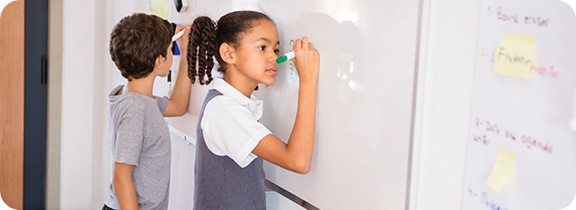
The AKA Learner Profile
The Aga Khan Academies (AKA) have developed a curriculum within the framework of the International Baccalaureate’s (IB) programmes. As such, the attributes of our learner profile are closely aligned to those of the IB learner profile.
Aga Khan Academies learners strive to be:
|
Inquirers |
We nurture our curiosity, developing skills for inquiry and research. We know how to learn independently and with others. We learn with enthusiasm and sustain our love of learning throughout life.
|
|
Knowledgeable
|
We develop and use conceptual understanding, exploring knowledge across a range of disciplines. We engage with issues and ideas that have local and global significance.
|
|
Thinkers |
We use critical and creative thinking skills to analyse and take responsible action on complex problems. We exercise initiative in making reasoned, ethical decisions.
|
|
Communicators
|
We express ourselves confidently and creatively in more than one language and in many ways. We collaborate effectively, listening carefully to the perspectives of other individuals and groups.
|
|
Principled
|
We act with integrity and honesty, with a strong sense of fairness and justice, and with respect for the dignity and rights of people everywhere. We take responsibility for our actions and their consequences.
|
|
Open-minded
|
We critically appreciate our own cultures and personal histories, as well as the values and traditions of others. We seek and evaluate a range of points of view, and we are willing to grow from the experience.
|
|
Caring
|
We show empathy, compassion and respect. We have a commitment to service, and we act to make a positive difference in the lives of others and in the world around us.
|
|
Courageous
|
We approach uncertainty with forethought and determination; we work independently and cooperatively to explore new ideas and innovative strategies. We are resourceful and resilient in the face of challenges and change.
|
|
Balanced |
We understand the importance of balancing different aspects of our lives – intellectual, physical, emotional and spiritual – to achieve well-being for ourselves and others. We recognise our interdependence with other people and with the world in which we live.
|
|
Reflective
|
We thoughtfully consider the world and our own ideas and experience. We work to understand our strengths and weaknesses in order to support our learning and personal development.
|
|
*Leaders |
We understand that multiple perspectives will allow us to make better decisions, and seek opportunities to work with a variety of others. We perceive and anticipate needs and problems, and are able to motivate ourselves and others to tackle problems, confidently and cooperatively.
|
|
*Stewards |
We understand the interconnectedness of communities, striving to create harmony in our environment, while considering the needs of all members. We are motivated to leave the world a better place.
|
© International Baccalaureate 2013
IB learner profile booklet
*Unique attributes of the Aga Khan Academies learner profile
Jemin Patel (Class of 2018): A journey of hard work, passion and striving for excellence
Jemin Patel’s journey to where he is now is the result of hard work and passion, values he picked up during his time at the Aga Khan Academy Hyderabad. Yet his story started sometime before this, when he was selected to attend the large, 100-acre Academy through a full scholarship.
Starting in the Academy as a Grade 8 student, Jemin felt all the nervousness of moving to a new place and starting at a new school. He felt out of place, not knowing whether he would succeed. Although he knew this would be difficult, he embraced the notion of working hard, instead of working smarter.
“I’ve learnt that hard work always wins,” he said. “People say, ‘work smart, not hard’. I could not disagree more. Working smart makes you efficient, whereas working hard with a focused mindset makes you a high performer.”
Although it has been five years since he graduated, Jemin continues to visit the Academy to coach and interact with students. He expressed how he felt like a big brother passing on the torch and imparting wisdom he would have loved to have during his time at the Academy. During his most recent visit, Jemin met the founder of the newly formed SAGE (Sexuality and Gender Expression) club at the Academy and felt so proud of the students.
Now, working at one of Canada’s top accounting and consulting firms, Ernst & Young, specialising in audit and assurance services, Jemin still stands by the notion, “hard work always wins.”
“It’s not about perfection, it’s about striving for excellence,” he said. “Putting in a focused and genuine effort into everything you do is all that matters.”
Interview conducted by DP2 student Samhitha Paruchuri from the Aga Khan Academy Hyderabad.
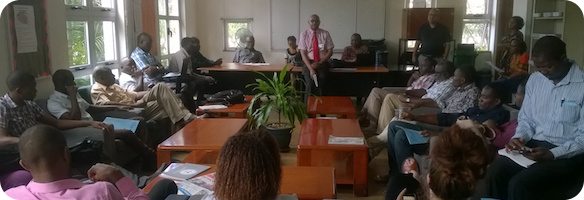
Meet the Staff
Senior leadership team |
||||
| Head of Academy |
Colin Webster |
|||
| Head of Finance |
Patrick Wambua |
|||
|
Principal Senior School Principal Junior School |
Francis Kariuki Nuala Alibhai |
|||
| Dean of Studies |
Bernard Dudi |
|||
| Head of Residential Life |
Benson Wafula |
|||
| Head of Facilities and Campus Infrastructure |
Bruce Iningu |
|||
| Head of Human Resources |
Stella Njagi |
|||
Administration and support services |
||||
|
Personal Assistant to Head of Academy |
Florence Oduol | |||
|
Business Analyst |
Sheetal Shah | |||
| Accountants |
Maureen Makachia Hannah Kinuthia Amorale June Michael Kizito |
|||
| Finance Manager |
Evangaline Wachira |
|||
| Head of Administration |
Morris Kitheka |
|||
| Administration Assistant |
Nanna Adede |
|||
| Assistant Manager, Facilities Administration |
Fredrick Agolah |
|||
|
Housekeeping Supervisor |
Kennedy Ogwang' |
|||
| Laundry Supervisor |
Wilson Guya |
|||
| Laundry Attendants |
Raphael Ngala Hellen Mbori Jackline Odhiambo Victor Mukabana Mary Okoth |
|||
| IT Manager |
Alex Oyugi |
|||
| IT Technicians |
Eugene Auka Byran Otieno Bonface Mulama |
|||
| Human Resource Officer |
Conceptor Odeke Festus Nyawa |
|||
| Executive Chef |
Nancy Chepkoech |
|||
| Assistant Manager, Dining & Events |
Gideon Ondieki |
|||
| Head Cook |
Kithunga Mangi |
|||
| Procurement & Special Projects Manager |
Sameer Rahemtulla |
|||
| Procurement Assistant |
Peter Amiani |
|||
| Communications Manager |
Aalia Kurji |
|||
| Marketing Manager |
Mary Wanjiru Kimani |
|||
| Admissions and PR Manager |
Rukaiya Husain-Devani |
|||
| Admissions Assistant |
Naomi Nyakundi |
|||
| Data & Examination Coordinator |
Domnic Bollo |
|||
| Administration Assistant, Senior School |
Elizabeth Bwana |
|||
| Lab Technicians |
John Ngala Kennedy Cosmas Stephen Kassim |
|||
|
Receptionist Events Assistant |
Victoria Sada Bakari Kazungu |
|||
| Vice Principal - Data & Academic Systems |
Kipkemoi Serem |
|||
| Residential Manager |
Benson Wafula |
|||
|
Senior School Librarian Assistant Librarian |
Joyce Wangari Maureen Mumasaba |
|||
| Curriculum Development Manager |
Alex Holland |
|||
| Service Learning and Student Leadership Development Manager |
Kauthar Mohamed |
|||
| Vice Principal Student Support and Well-being |
Minal Shah |
|||
|
|
||||
Junior school faculty |
||||
| Principal |
Nuala Alibhai |
|||
| Vice Principal, PYP Coordinator |
Kepha Mogere |
|||
|
Administrator – Junior School Junior School – Library Clerk |
Rebecca Davis Tungwa Nyiro |
|||
|
Student Support and Well-being Co-ordinator - Junior School |
Peter Muraguri | |||
|
Class Teachers |
||||
| Year 1 Class Teachers |
Margaret Mwaka |
|||
| Year 2 Class Teachers |
Hope Lumbukeni |
|||
| Year 3 Class Teachers |
Enitta Olang' Lillian Mwendwe |
|||
| Year 4 Class Teachers |
Ruth Msae |
|||
| Year 5 Class Teachers |
Anuradha Mohsin |
|||
|
Teaching Assistants |
||||
| Junior School |
Tom Odhiambo Janet Ambila Edgar Barasa Maryam Shallo |
|||
|
|
||||
|
Single Subject Teachers |
||||
| Kiswahili |
Esther Kariuki |
|||
| Art |
Parveen Samnani |
|||
|
Music Drama |
Alice Adhiambo Gloria Muthoni |
|||
| P.E. |
Beverlyn Injairu |
|||
| Trandlanguaging |
Fatuma Mukoya |
|||
|
Student Learning Support Unit |
||||
| Junior School Student Support & Well-being Co-ordinator |
Peter Muraguri |
|||
Professional Development Centre & Outreach |
||||
| Head of Professional Development Center |
Dr Maina WaGioko |
|||
| Learning Toolkit Kenya Coordinator |
Enos Kiforo |
|||
| Learning Toolkit PD Coordinator |
Rose Iminza |
|||
| Foundation for Learning (F4L) Course Coordinators |
Charles Maina Ahmed Ibrahim Dr Benerdeta Malusi |
|||
| F4L Monitoring & Evaluation Officer |
Paul Ngugi |
|||
| Administration Assistant, F4L |
Pius Mulatya |
|||
| IT Support Officer, F4L |
Samuel Kimwele |
|||
| TPP Coordinator |
Dr Tom Abuto |
|||
Senior school faculty
|
||||
|
Principal Personal Assistant to Senior School Principal |
Francis Kariuki Lillian Kameno |
|||
|
Diploma Programme Coordinator Middle Years Programme Coordinator |
Julius Menza Nancy Oruko |
|||
|
Vice Principal, Data and Academic Systems Vice Principal Student Support & Well-being |
Serem Kipkemoi Minal Shah |
|||
|
Teacher Coaches |
Antoinette Blain Natasha Haque |
|||
|
Science Department Alice Ndung'u (Head of Department) |
||||
|
Erick Agira |
||||
| Godfrey Kokeyo | ||||
| Moses Orwe | ||||
|
Lucy Mwandawiro |
||||
| Kiran Pandey | ||||
| Duncan Russell | ||||
| Fred Bongu | ||||
| Jackson Ltorisha | ||||
|
|
||||
|
English Department Priti Avetikian (Head of Department) |
||||
| Iyad Yuka | ||||
| Amos Muuo | ||||
| Faith Abuya | ||||
| Beatrice Mecha | ||||
|
Mathematics Department Eric Ouma (Acting Head of Department) |
||||
|
Vincent Mboga |
||||
|
Edwin Basiime |
||||
| Evance Ogada | ||||
| Safari Fondo | ||||
| Catherine Orwe | ||||
|
Technology Fredrick Wagah (Head of Department) |
||||
|
Serem Kipkemoi |
||||
|
Nelson Wakesa |
||||
|
Perpetual Mwangi |
||||
|
|
||||
|
|
||||
|
Expressive Arts Grace Owaga – Head of Department |
||||
|
Antoinette Blain (Teacher Coach) |
||||
|
Ernest Kisali |
||||
|
Census Wandera |
||||
|
Joyce Agiri |
||||
|
Eric Mukiira |
||||
|
|
||||
|
Modern Foreign Languages Michael Ojuma (Head of Department) |
||||
| Shariff Al Beiti | ||||
| Henry Nyagah | ||||
| Husniya Sharkamamadova | ||||
| Fatuma Ibrahim | ||||
| Daniel Otogo | ||||
| David Ochola | ||||
|
|
||||
|
Humanities Department Susan Abuto (Head of Department) |
||||
| Mary Nyandieka | ||||
| George Kamau | ||||
| Charles Sebalinga | ||||
| George Kamau | ||||
| Beryl Owino | ||||
|
Lydia Kemunto |
||||
|
Physical Health Education Department Antony Ndungu (Head of Department) |
||||
| Jackson Kanyingi | ||||
| Polycarp Ageta | ||||
| Yusuf Kauli | ||||
| Pauline Juma | ||||
|
Life Guards: Raymond Mwatsuma Yusuf Kauli |
||||
|
Sports Store Keeper Farid Ahmed |
||||
| University Counsellors | ||||
| Lucinda Ochieng | ||||
| Paula Russell | ||||
|
Academy Fellows |
||||
|
Jordan Westlake John Morris Nyagaka Shane Omole Ozru Abdurahmonov Zahra Muia Catherine Delight |
||||
|
Health & Wellness Center Medical Doctor: Dr Eric Wekesa Wanjala |
||||
|
Nurses: Kelvin Mbaya Eunicate Karimi Jacktone Okoro Milka Gatungoh |
||||
|
|
||||
|
Head Cooks |
Emily Oyugi Kithunga Mangi Irene Kwekwe |
|||
|
Cooks |
Irene Kwekwe Dones Mwachia Jedidah Muthui Fridah Mkara Mary Mukana Salim Juma Jean Livumbazi Irine Auma Isaac Achevi Peter Kaviti Brenda Kaiza |
|||
|
Stewards: |
Jacob Kitsao Betty Khavele Sophie Okeyo Eunice Indulachi Phyllis Bwamula Kioko Muli Emily Salame |
|||
|
|
||||
|
|
||||
To contact any staff via email, put their first and last name together and separate it with a "." followed by @agakhanacademies.org (ex: john.doe@agakhanacademies.org).
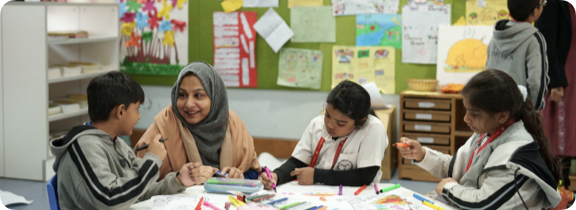
Meet the Staff
Senior leadership team |
|||||
| Head of Academy |
Suvina Shunglu |
||||
|
Principal Senior School |
Fahmida Chowdhury |
||||
|
Principal Junior School |
Shatila Reza |
||||
| Dean of Studies |
Joseph Sydney Hamkari |
||||
| Head of Finance |
Karim Nathu |
||||
| Dean of Admissions |
Paul Davis |
||||
Administration and support services |
|||||
|
Personal Assistant to Head of Academy |
Fariza Sddika | ||||
| Finance Manager |
Abdullah Al Jaber |
||||
| Head of Administration |
Malik Mahemood |
||||
| Facilities and Maintenance Manager |
Kazi Atiqul Haque |
||||
| IT Manager |
Faruk Sikder |
||||
| Head of Human Resources |
Annie Sharmeen |
||||
| Human Resource Specialist |
Ayesha Sirajee Leena |
||||
| Security and Transport Manager |
Mahmudul Hasan |
||||
| Tansport Supervisor |
Mustafizur Rahman |
||||
| Procurement Supervisor |
Delwer Hossain |
||||
| Communications Manager |
Monjure Alahi Haider |
||||
| Admissions Manager |
Momtaz Mumu |
||||
| Food Services Manager |
Mohammad Mainuzzaman |
||||
Junior school faculty |
|||||
| Principal |
Shatila Reza |
||||
| PYP Coordinator |
Tanjina Hossain |
||||
| Early Years Coordinator |
Shahnaz Khan |
||||
| Administration Assistant |
Zohra Virani |
||||
|
Homeroom Teachers |
|||||
| KG1 | Karima Salim Jiwani | ||||
| KG2 | Jannatul Ferdous | ||||
| KG3 | Islama Khandoker | ||||
| Grade 1 |
Fahmida Sharmeen Rahman Kaniz Taskina Trisha |
||||
| Grade 2 |
Shama Ahmad Humayra Rayhana Khan |
||||
| Grade 3 |
Nadia Tazrin Chowdhury Hosna Ara |
||||
| Grade 4 |
Saadiah Shams Shakhawat Tasnim Janan Fatema Bushra |
||||
| Grade 5 |
Farjana Mobin Anjuman Ara Begum Sabina Yasmeen |
||||
|
Teaching Assistants |
|||||
| Junior School |
Nadya Malik Mahemood Sadia Chowdhury Bushra Naziat Islam Shupti Zarmin Samdani Neshma Gilani Afrin Shahid Farhana Afroj Khan Rafa Mahmood Syeda Nafisa Fahrin Sonia Islam NafisaTasneem Mubina Rahman Uzma Perveen Lisa Aafra Fatema Karim Nafisa Nawar Tajim Chakma Md Shakhawat Hossain Noor Salam Kamrul Islam |
||||
|
|
|||||
|
Single Subject Teachers |
|||||
| Art and Craft |
Saiful Hoq Shadal |
||||
| Physical Education |
Tasnuva Haque |
||||
| Music |
Sanchita Saha |
||||
| IT |
Ashraful Alam |
||||
|
Student Learning Support Unit |
|||||
|
Student support coordinator & learning support Lead |
Maliha Afzal |
||||
|
Learning Support Teachers |
Benta Odipo Hilde Napeñas Neculai Pieptu |
||||
Professional Development Centre & Outreach |
|||||
| Head of Professional Development Centre and Outreach |
Md. Musle Uddin Bhuiya |
||||
| Education Officer |
Tozammel Haque |
||||
Senior school faculty
|
|||||
|
Principal Administrative Assistant |
Fahmida Chowdhury Farida Ali |
||||
|
Diploma Programme Coordinator Middle Years Programme Coordinator |
Usha Kasana Ira Srivastav |
||||
|
Theory of Knowledge Coordinator |
Jina Saha |
||||
|
Business Teacher & Supervisor of Sports' CAS and Activities |
Munira Karim |
||||
|
Lead Teacher Performance Art and Personal Project Coordinator |
Vishwajit Shinde |
||||
|
Library Syeda Mukta Begum (Head Librarian) |
|||||
|
Zahura Begum (Junior School Librarian) |
|||||
|
Mir Adiba Awlad (Teacher Librarian) |
|||||
|
Science Ira Srivastav (Lead) |
|||||
|
Anika Tasfia Rodoshi |
|||||
| Abul Fazal M. Shahriar | |||||
| Shahriar Rashid Khan | |||||
|
Rokaiya Ahmed |
|||||
| Ramisa Bushra | |||||
| Salsabil Tabassum Synthia (Physics) | |||||
|
|
|||||
|
English Raja Sen (Lead) |
|||||
| Nusrat Amena Shampa | |||||
| Aziza Choudhury | |||||
| Sultana Nasrin Chowdhury | |||||
| Mohammad Tanvir Amin | |||||
|
Bangla Rokhsana Afroz (Lead) |
|||||
|
Mukta Jasmine |
|||||
|
Mafruha Rahman |
|||||
| Mousumi Islam | |||||
| Shamima Nasrin Shanta | |||||
| Rifat Ara Islam | |||||
|
Mathematics Manasi Biswajeet Mallick (Lead) |
|||||
|
Fatima Momin |
|||||
|
Nazifa Rezwana Haque |
|||||
|
Mohammad Zafar Mahmud |
|||||
|
Shamanta Sharmin Shithi (Theory of Knowledge Coordinator) |
|||||
|
Tabassum Binte Jamal |
|||||
|
|
|||||
|
Expressive Arts (Design) Atia Maqshura (Lead) |
|||||
|
Shammi Akhter Chowdhury (Computer Science and EE Coordinator) |
|||||
|
Syeda Naushin Tabassum |
|||||
|
Fahmida Khatun (Visual Art) |
|||||
|
Md. Shakhawat Hossain Bhuyian (Visual Art) |
|||||
|
Syeda Naushin Tabassum |
|||||
|
|
|||||
|
Humanities Department Jina Saha (Lead) |
|||||
| Kazi Jebun Nesa | |||||
| Momena Farzana Hossain | |||||
| Tasnia Tabassum | |||||
| Mahmuda Akter (Integrated Social Studies) | |||||
| Nabila Islam (Service Learning Coordinator) | |||||
|
Physical Health Education (PHE) Amit Ahire (Lead PHE Teacher and Wellness Coordinator) |
|||||
| Most. Ulfat Zahan | |||||
| Classroom Technology Integration | |||||
| Md. Ramim Ul Haq | |||||
| University Counsellor | |||||
| Nusrat Sharmin | |||||
|
Infirmary Medical Officer: Dr Mahin Hossain |
|||||
|
|
|||||
|
|
|||||
To contact any staff via email, put their first and last name together and separate it with a "." followed by @agakhanacademies.org (ex: john.doe@agakhanacademies.org).
Mary Favour (Class of 2015): Ambitions to build a better future
For a while, getting an education was a process for Mary Favour. She would rise early in the dark – at 4:00 am – and make the long trek to school on foot with her three siblings, arriving at around 6:30 am each day. By the time they returned home to Mombasa, it was 7:00 pm. The rest of the evening was spent helping their mother around the house and finishing their homework.
It wasn’t easy, Mary recalled.
“My sisters and I grew up with a single mother,” she said. And resources were tight.
When the electricity bill wasn’t paid, the Favour children would study under the dim glow of a kerosene lamp or by candlelight. The four siblings had limited school supplies and relied on Mary for many of their study materials.
“We got awarded books if we topped the class,” she explained. “Sometimes we’d get textbooks, other times we’d get storybooks or novels. It was an incentive that the teachers had to motivate students.”
A new opportunity at the Aga Khan Academy Mombasa
Despite the obstacles, Mary said her mother was determined for her to succeed. She pooled her resources to give Mary a much-needed laptop in grade 9. By then, things had begun to turn around – Mary had received a full scholarship to study and live at the Aga Khan Academy Mombasa as part of its Talent Identification Programme, a programme that provides students from more disadvantaged backgrounds the opportunity to attend the Academy on full scholarship. She would graduate in 2015 and go on to study at the University of Toronto in Canada, also on full scholarship.
Now a second-year student at university, Mary hasn’t forgotten her difficult upbringing or her roots. In fact, the struggle to get an education early on has instilled in her a strong desire to give back to her community and help others like her get a shot at a better life.
“Six years of growth, skill and a good education” at the Academy was “a gift,” Mary said. “I want to [give] a gift to someone else.”
In particular, she’s learned the importance of independence, humility and sacrifice – lessons she put to use during her Academy days.
Mary joined the Aga Khan Academy in 2009 as part of the first batch of students in the Talent Identification Programme. While there, she participated in a range of activities, including choir, soccer and debate, with the same level of perseverance her mother had taught her. She quickly excelled academically, becoming an honors student in grade 10, and also challenged herself in extracurriculars – musically in competitions and as the assistant captain of her hockey team.
Helping others through community service
Beyond this, Mary fostered a passion for community service and activism rooted in her desire to help outsiders fit in. She led the ‘Just Say No’ initiative, a programme focused on rehabilitating primary school girls in Mombasa who had turned to prostitution in large part to support their families financially.
She worked with these girls for three years, exposing them to the same opportunities she and other students had the privilege of in their own education, including sports and debate. She hosted workshops on public speaking and art, as well as sessions with counsellors and strong female mentors, and invited the girls to perform at the Academy’s talent competition.
“The aim was to help them feel integrated into society but at the same time equip them with skills that would make their education holistic,” Mary said. The mission was especially important, she said, because of the gender gap she saw in Mombasa’s primary schools and the way in which this unfair system contributed to larger problems down the line.
“That inequality creates an imbalance that marginalizes women in our society,” Mary said.
Under her leadership, the club received three awards and became one of the most successful student groups on campus.
Supporting other students to succeed
In addition, Mary founded the ‘I Know Who I Am’ initiative, a programme that integrates scholarship students like herself into the Academy community while understanding that they needed to “stay in touch with home and not forget their society,” as Mary explained.
“I wanted to celebrate the diversity that came with these students but at the same time make sure that they don’t lose themselves,” she said. So she ran workshops on pluralism and open-mindedness, ate food and played games the students would recognise from home and “held discussions on what it meant to be part of a community but remain true to yourself.”
In the summer of 2017, Mary interned with the Students for International Development. The non-profit organisation was founded and is run by students. While there, she worked with the Orphan Sponsorship Programme as project manager for about two months. Mary and her team focused on the Simboyi Primary School in Vihiga, in the west of Kenya. They were in charge of the remedial education project for orphans and also worked on projects to support students financially.
After conducting interviews with some of the students in Vihiga, Mary and her team developed a means by which to help them be better equipped to reach their full potential. According to Mary, a number of the students came from families that were struggling to make ends meet. Some, she recalled, told her they only had one meal per day, which usually consisted of just ugali or porridge. Others said they didn’t eat at all. Further, a number of those who performed well in class were unable to pay for their exams and had to sit them out instead.
With Mary’s help, the organisation created a scholarship to help these students. The award, which she said covers basic health care, one meal a day, a yearly uniform and exam fees, will be able to assist 55 students during the current academic year at Simboyi. The hope is that the sponsorships will continue into the next year if budget and fundraising allow.
Real-time results and change like this mean the world for Mary, not least because she knows firsthand what it’s like to have the academic situation and resources not in your favour.
“I was a child with big dreams and no way of actualising them until I joined the Academy,“ she said. “I want to be for someone else what the Academy was to me.”
Catalyzing change for a better future
Mary believes education is one of the best tools to rid our societies of poverty, and she’s determined to be in a position to support students so they have better paths forward at their disposal than what she had. That’s why she plans on returning to Kenya after she’s obtained the necessary experience and skillset to properly give back to her country and community.
Currently majoring in human geography and diaspora and transnational studies and minoring in African studies, Mary thinks that, through the study of cultures and international development, she can better understand how to bridge the gap between rich and poor at home. Her hope is to protect the rich cultural diversity of Kenya but also contribute to changing the country so that it is better able to develop and sustain itself and compete and interact on a global scale more effectively.
“Kenya is at such a pivotal moment in the making of African history,” she said. “It has so much potential. I just want her to maximize her potential. I want to help her do it.”
Mary is uniquely positioned to kickstart such a change at home. Her pluralistic perspective on the world and passion for country could be just what Kenyans need to motivate their leaders to be better and to take action to institute real change. And if her triumphs at the Academy are any indication, Mary’s motivation may just be contagious.
By Farah Mohamed
PYP Exhibition
Support our Year 5 students at the Junior School as they present on Friday 06 May.
Alumni
Education at its best facilitates positive growth in all domains – intellectual, social, physical, ethical and spiritual – leading to the well-rounded development of the child. The Aga Khan Academies aim toward this ideal, and the values they espouse are reflected in each school’s aspirations for its students.
The vision for Aga Khan Academy graduates
Students at an Academy pursue a well-balanced education combining intellectual inquiry, academic excellence, sporting and cultural activities, and a grounding in ethics and moral reasoning.
They are committed to rigour and self-discipline in their studies and subscribe to the principles of intellectual honesty in the preparation of their work.
Read more here.
The Aga Khan Academy Alumni Network
Fill out the AKA Alumni online questionnaire here
Connect with us via our Facebook and Instagram pages.
Interested to know more about our graduates? See spotlights on our alumni
Cinzia Torriani: The budding environmental activist
Growing up on Funzi Island, a settlement in Kenya, Cinzia Torriani, a Diploma Programme 1 student at the Aga Khan Academy Mombasa, has seen the impact climate change can have on the environment and the people within it.
“I saw the aquatic life in the bay that surrounded a part of the island deteriorate over time,” Cinzia said. “Fish disappeared from the easy view of the waters, dolphins, which would appear annually, stopped appearing, and I would even hear stories of animals that were once habitants of the bay as now a distant memory. Contrary to this, the number of fishermen stayed the same, and at some point, every small fish in the ocean was being caught to feed a fisherman’s family. I realised that a majority of the motives put in place on the island for helping the environment served little purpose towards establishing a feasible way forward to ensure locals, who depend on the ocean, would remain economically stable.”
By seeing this and her parents’ personal initiatives toward the environment, Cinzia channeled her energy into becoming an environmental activist, focusing on ways to better her environment while also keeping in mind the local community.
“My goal is to ensure sustainable economic and ecological development to consider both my love for my surroundings, but also the community,” Cinizia said.
Taking action
One of the first initiatives Cinzia made in relation to her goal happened a year ago during her Year 10 personal project, which allows students to collaborate with individuals in their local community to address an issue or challenge. Cinzia created an integrated farming system combining a fish farm, chicken farm and maize farm in a self-sufficient cycle. Through this system, human efficiency would be maximised; the harvest timeline would be effectively eradicated; and locals would be provided with an alternative and more productive way to get fish from the ocean.
“I was able to build this system and present it to the locals in my community while also further spreading the word about my personal project,” Cinzia said.
Following the completion of her personal project, Cinzia was able to further spread her message about the environment by speaking at the 2019 TEDxYouth event held at the Academy. In her talk, Cinzia spoke about the importance of fighting complacency in order for action to be taken toward the environment, while also discussing her personal project as a way of implementing a new agricultural system.
“This was one of the most thrilling and greatest memories I hold,” Cinzia said. “I was able to use my voice as a way to spread my opinions and ideas on what mattered to me to a group of people who were interested in listening. From this, my story was published in one of the nation’s newspapers, Business Daily, about my project, my TEDx talk and my future goals. This provided me with the opportunity to convey my message about environmental sustainability to a larger audience.”
During this academic year, Cinzia has taken steps to further her goal and spread awareness about the environment. This was seen during the Academy’s annual Peace Summit, which is a two-day event bringing together students from the Academy and around Mombasa to discuss peace and conflict resolution. The theme for this year’s Summit was “Climate Action for Peace” with Cinzia being selected as the female student lead for the event.
“The aim of the Summit was to take students through several thought-provoking and interactive activities to question their stand as activists for peace, linking this directly to the environment’s state,” Cinzia said. “From discussions on the dangers of rising sea levels, to water scarcity, to the impacts of desertification and drought, the students promoted the value of being environmentally conscious and reflecting on the actions of mankind.”
Another way Cinzia was able to spread awareness about the environment was through community service. As part of the International Baccalaureate, Diploma Programme students have to create a community service group or be a part of an existing one. For Cinzia, she saw this as an opportunity to reconnect with the local community and spread awareness.
“My friend and I created a community service project at the Academy called iSEAyou,” Cinzia said. “Our current goals include making use of polluted materials to create purchasable furniture and art, as well as promoting sustainable environmental development without any implications on the economic standards of members of society through creating and building projects, such as those I proposed in my personal project.”
Looking forward
As Cinzia continues to decide what she wants to study when she goes to university, she said she will always be an environmental activist wherever she goes. and is forever grateful for those who have guided her to get to where she is.
“I feel that no matter what career path I go into, it has become a hobby and a joy to raise awareness on the environment and work towards more environmentally-friendly systems in society,” Cinzia said.
For Cinzia, being an environmental activist doesn’t mean dedicating your entire life to the environment. She said anyone can be an advocate for the environment through various, simple ways.
“Personally I feel that simply having the strive to make a difference completely changes the path for society in order to reach end goals,” Cinzia said. “I feel that students at the Academy should work towards becoming more environmentally-conscious throughout their day-to-day lives to take little actions that make a great difference. Involvement in different initiatives taking place at the Academy also helps grow one’s character, and I feel that this is a prospect that should not be missed. I would actively encourage students to join these different teams and groups and work towards the betterment of the planet.”
Reflecting on the time she has spent so far at the Academy, Cinzia said she appreciates the supportive and nurturing environment at the Academy, which has opened many doors of opportunity for her. She said she is also grateful for her friends and family who have guided her and stood by her side throughout this all.
“The Aga Khan Academy Mombasa has instilled lifelong ethical values in me,” Cinzia said. “Through this education, I have gained a great awareness on the importance of continuously considering my environment and my community in decision-making. The values of giving back to your community and the opportunities provided by the Academy to do so are endless and truly incredible. My teachers at the Academy were one of my anchors of support as they continuously encouraged me to reach my goals and push harder. I cannot give enough gratitude to Mrs. Susan Abuto who, as the head of the Individuals and Societies department, has guided me throughout this journey, especially in spearheading this academic year’s Peace Summit. I also would not have been able to reach many of my goals without the support of my friends, family and special people in my life who stood by my side throughout this long process.”
